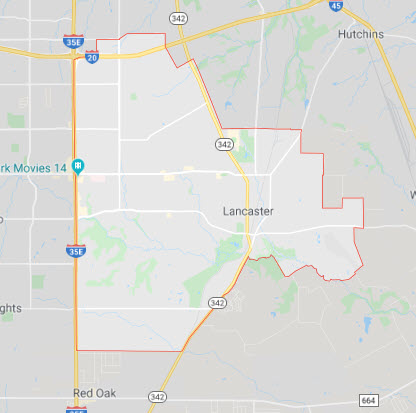Colin Irons Pool Service has been helping residential and commercial customers in the city of Lancaster for over 20 years. If you suspect your pool has a leak, call Colin Irons to setup a pool leak detection appointment where they will properly identify the location(s) and repair your pool leak.
Lancaster, TX sits in the North Texas region that experiences extremely dry summers where your ground can begin to shrink and cause pipes to crack. Unfortunately, pipes cracking is a fairly common issue for swimming pools and if you find yourself to be one of the unlucky ones, Colin Irons will come to your rescue.
Other common areas that could be causing your pool in Lancaster to be leaking could be:
- Leaks in the pool equipment. Common areas would be the piping, filters, heater and pumps.
- Check the fittings in the pool for tears or separations.
- Also check lights, skimmers, returns, pool steps and corners for any obvious issues.
You can also determine if your pool is definitely leaking versus typical evaporation.
- Look for standing water in the lower areas around your pool.
- Walk around your pool and check for soft soil that is not typical.
- Mark your water level with a piece of tape and in 24 hours check to see if it has lost more than 1/4″. If less, it’s typical evaporation. If more, then you could definitely have a leak.
If you’ve determined your pool is leaking, call the professionals at Colin Irons. Your Lancaster pool leak specialists.
Serving the 75134 and 75146 zip codes
Lancaster is a city in Dallas County, Texas, United States. The population was 36,361 at the 2010 census. Founded in 1852 as a frontier post, Lancaster is one of Dallas County’s earliest settlements. Today, it is a suburban community located in the Dallas-Fort Worth Metroplex, approximately 15 miles (24 km) south of Downtown Dallas.
Lancaster is part of the Best Southwest area, which includes Lancaster, Cedar Hill, DeSoto, and Duncanville.
In 1841, an act of the Republic of Texas Congress authorized President Mirabeau Lamar to enter into a contract with William S. Peters and nineteen associates to promote settlement in North Texas and paid the company with free land in exchange for recruiting new settlers. Around 600 families would settle in what became known as Peters Colony from 1841 through 1844. The Peters’ group advertised heavily in Kentucky, Illinois, Missouri, and Tennessee, and for that reason, many of the earliest settlers were from those states. The first group to settle in the Lancaster area was Roderick Rawlins and his family from Greene County, Illinois. They left for Texas in September 1844. Rawlins and two of his sons-in-law came ahead to select the general area where they would settle. They chose an uninhabited area south of Dallas along the north bank of Ten Mile Creek as the site of their new settlement. In December 1844, the three men went back to Lamar County near the Red River to bring the rest of their wagon train. All of the settlers had arrived by January 2, 1845 and they formed a community known as Hardscrabble. It consisted of two rows of log cabins with a street running north and south. In total, 30 men, women, and children lived in Hardscrabble.
Several miles north of Hardscrabble, a second community called Pleasant Run was established in 1846 by Polly Rawlins, one of Roderick’s daughters, and her husband Madison Moultrie “M.M.” Miller. Together, the Millers built a two-room structure with one room used as a general store and the other for living. By 1848, the structure had grown to fifteen rooms, a separate store, and a warehouse. A post office was established with biweekly mail delivery and Miller as postmaster. By 1850, he had laid out a town and sold lots, but never filed a plat of the community with Dallas County. At its peak, Pleasant Run boasted a stage stop, school, and steam-powered grist mill in addition to Miller’s store. Accelerated by the death of M.M. Miller in 1860, Pleasant Run declined. Shortly after the Rawlins’ settlers abandoned the Hardscrabble settlement, Lancaster became the dominant community in the area.


